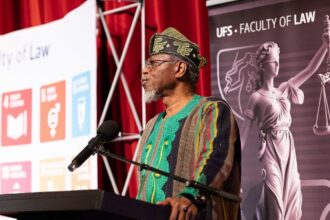IT is no longer in doubt that one of the key problems Nigeria is facing is abject poverty among its citizens. Poverty, according to the United Nations, means lack of basic capacity to participate effectively in society. It means not having enough to feed and cloth a family, not having a school or clinic to go to, not having the land on which to grow one’s food or a job to earn one’s living, and not having access to credit. It means insecurity, powerlessness and exclusion of individuals, households and communities.
With the United Nations’ definition of poverty, one would understand that it is more than the state whereby a person lacks what to eat or drink. Rather, poverty means any form of lack. This is the third week since Nigeria celebrated its 59th independence from British colonialism.
Our freedom from the rule of the whites (British) is indeed a thing of joy. But the questions that bother one are: what have we achieved so far? What is the effect of the government’s so-called achievements on the lives of the masses? Last year, Nigeria, “the giant of Africa”, overtook India as the country with the most extremely poor people in the world. It is a glaring fact that little or nothing has been done to overcome the poverty trap since 2018.
The government must reduce the extreme poverty that more than 86 million Nigerians are wallowing in. The vast increase of extreme poverty in Nigeria is really alarming; it has been leading many Nigerians to commit different forms of crime such as prostitution, drug dealing, robbery, cyber crime,fraud, human trafficking and the like.
Man faces trial for allegedly removing another man’s teeth
Out of desperation to earn a living, many people fall victim of slavery (human trafficking) sheepishly. On the 3rd of this month, 13 victims of human trafficking that were sold into Burkina Faso reunited with their family members in Kankara Local Government Area of Katsina State after three months of slavery in the landlocked West African country. Another 10 victims were taken to Gusau, Zamfara State, to reunite with their families.
According to them, they were not aware they were being sold into slavery until they got to Burkina Faso. The man who tricked them out of Nigeria to Burkina Faso promised them menial jobs with substantial incomes. Their words, as The Punch newspaper reported: “Some of us became sick in the process and had to depend on some sympathetic Nigerians and some people from Niger Republic who assisted us with food and bought needed drugs for us.
We lived in that condition for three months.” With the account given by the victims, one would see that the 23 men accepted the job offer because of poverty and inability to feed their family members here in Nigeria. In order to curb social vices such as human trafficking, our government must create job opportunities with substantial and regular pay. Civil servants need not go on strike before they get paid their salaries.
Investment in education, most especially for female children, is imperative. Government data from October 2018 shows that Nigeria has the greatest number of children that are out of school. It was reported that the number increased from 10.5 million to 13.2 million, and around half of the number are girls.
It is very essential that our governments invest more in education. If we want our university graduates to be at a competitive edge with graduates in the developed countries, we need to invest in education and employ knowledgeable and experienced people as teachers. Laboratories in state and Federal Government-owned institutions should be well equipped with the latest technological equipment so as to meet up with the trend in the developed countries.
There should not be any form of inequality in the academic sector, whether through ethnicity or gender. For instance, in the northern part of the country, females are often seen as wife materials and baby-making machines. Many people in the North still believe that girls do not need to be educated since they will eventually get married and stay indoors, doing necessary house chores or helping on the farm.
This ideology has pushed a lot of underage girls into marriage, laying down their dreams and aspirations on the marital bed. In other words, education will help break the cycle of chronic poverty that is prevalent in our society, especially in Nigeria’s northern region.
Government aid in health and agriculture sectors will help to reduce the high rate of poverty in our society. The primary reason people work is to feed themselves and their families. Therefore, high cost of foodstuffs will definitely reduce the quantity of a person’s daily intake and choice of diet.
With this, such a person will be diagnosed with malnutrition and some other dietetic diseases which will reduce his or her work efficiency. And with time, frustration and the thought of making more money through dubious means could set in. We need to invest as much as possible in the agricultural sector.
Farmers should be enlightened about the latest developments in agriculture and be equipped with essential instruments. Farmers are having hard time accessing loans to get the right machines required to run a successful farm. Lastly, corruption is the ultimate hindrance to our better tomorrow.
There should be severe punishment for any government official who by any means embezzles public funds; no matter how little the amount of money. Where there is corruption, development will never be possible. There is also a need to cut down on all unnecessary expenses and focus on how to generate revenue in order to reduce the burden of the country’s indebtedness. The government should focus or money on how to achieve development in real terms.
Using the budget to service debts will not help. Needless to say, the government should not take fresh loans.
- Akinde is a student of Mass Communication at Adekunle Ajasin University, Akungba-Akoko, Ondo State.








